The Best Municipal Software
In our guide to the top municipality software, we cover systems that simplify budgeting, citizen services, and asset management for cities and local government agencies.
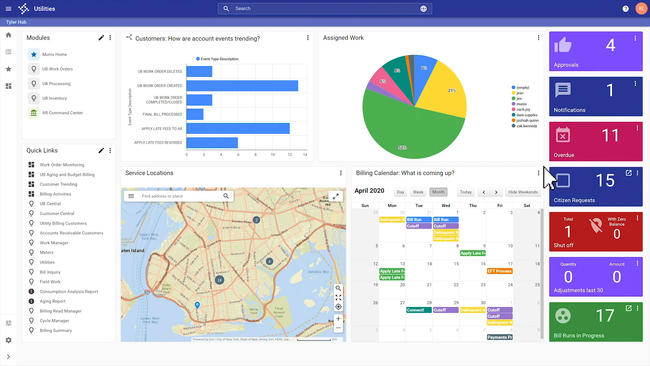
- Drag-and-drop tools to customize data visualization
- Exports data to Microsoft Excel
- Simplified property and asset management through GIS integration
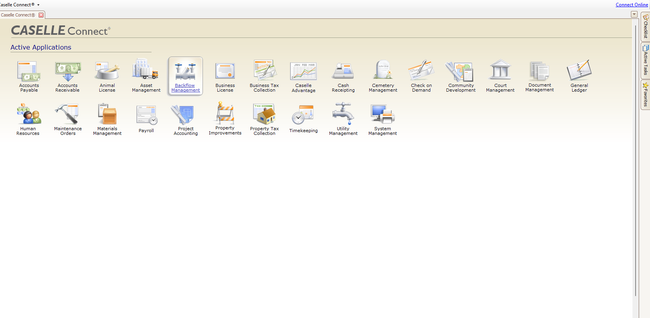
- Intuitive screen design
- Customizable data organization
- Includes payroll and general ledger modules
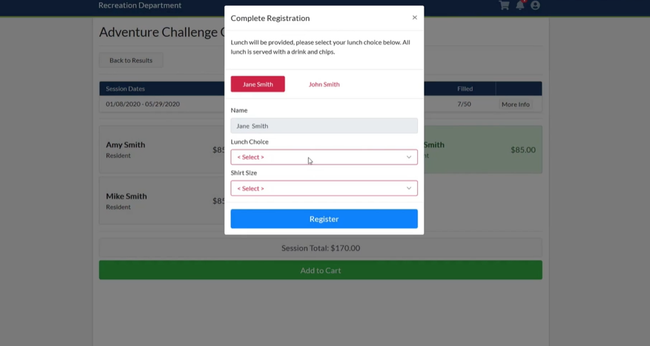
- Web portals and mobile apps for employees, residents, and vendors
- Can customize the system by only selecting specific modules that you need
- Streamlines finance, payroll, clerical work, and utilities operations
Municipal software is a financial management tool designed to help manage processes such as utility billing, tax collection, and permitting. We used our advanced review methodology to review top solutions for government agencies, public sector organizations, and municipalities.
- Enterprise ERP: Best Overall
- Caselle Connect: Best for Local Utility Districts
- Edmunds GovTech: Best for Small Local Government Agencies
- OpenGov: Best Budgeting Tools
- CitizenServe: Best Online Permitting System
- CloudPermit: Best for Local Governments
- AccuFund: Best Reporting Tools
Enterprise ERP - Best Overall
Enterprise ERP, formerly Munis by Tyler Technologies, makes budgeting smarter by aligning spending with public needs. Instead of simply adjusting last year’s numbers, its priority-based budgeting tool leverages AI and machine learning to assess financial data and spot cost-saving opportunities. This gives you a structured, data-driven way to put resources where they matter most.
It starts by breaking municipal services into individual programs; from there, it calculates direct and indirect costs to give you a full picture of where your money is going. If you need to find alternative revenue sources, Enterprise ERP helps identify those while tracking grants and external funding streams. This helps you maximize every dollar.
Enterprise ERP then assigns performance metrics to measure impact; it uses data visualizations to show whether spending is achieving your desired results. Built-in scenario planning tools help you project long-term financial sustainability. You can also generate interactive reports, making it easy to share budget insights with the public. In addition to reducing FOIA requests, this ultimately helps you build trust with your constituents.
Caselle Connect - Best for Local Utility Districts
Caselle Connect offers a municipal accounting software that helps local utility districts handle their own sewer, water, and waste billing in-house. The utility management module stores all citizen records and payment arrangements in a central workspace. Your staff can view histories on every resident’s location, meter, contracts, deposits, and loan information. So if a customer calls about an unusually high bill, it’s easy to check historical consumption and verify if the meter data matches recent readings.
You can also customize billing frequencies and rate formulas to match your service tiers or ordinances. In other words, you can set due dates for different services or define tiered usage rates to meet conservation goals. Plus, the utility energy assistance add-on applies credits directly to accounts, reports assistance transactions, and maintains clear balances. Meanwhile, delinquent accounts auto-trigger penalties, service orders, and shut-off notices as part of the same billing cycle.
Caselle Connect’s integration with electronic meter reading lets your staff import data from multiple systems and instantly update billing information. They can also override incorrect data to ensure accuracy before bills go out. It also supports multiple meter software standards simultaneously. Additionally, the real-time payment portal connects directly to the utility management module, so payments post to customer accounts automatically without third-party imports.
Caselle’s utility management system is modular, with applications like electronic meter reading or utility energy assistance available as connected add-ons. This lets municipalities start with a core billing and service system and expand as their needs grow.
Edmunds GovTech - Best for Small Local Government Agencies
Edmunds GovTech’s permitting and enforcement module is a great tool for local governments that need to uphold jurisdiction codes. You can add any permit, ordinance, or violation type without limitations. It’s also flexible, allowing you to easily define requirements, fees, and inspection steps with custom fields. You can even upload all relevant documents to track parcel history.
Additionally, you can manage all inspections from one dashboard. Easily schedule them through the self-service portal to ensure violations are resolved as soon as possible. The portal is available for not only inspectors but homeowners and contractors, too, so everyone can access the current permit information and results. Through the mobile app, your team can issue violations right from the field to save them time.
Edmunds GovTech is a great option for small agencies because of its integrated municipal modules, such as utility management, tax management, and citizen engagement. Pricing starts at $5,000 for a perpetual license, but exact costs require a custom quote. It depends on your town size, user count, and desired features.
OpenGov - Best Budgeting Tools
OpenGov’s budgeting and planning module helps generate more accurate and timely budgets for the public sector. A key functionality within this module is its capital planning, which allows for multi-year capital improvement programs integrated with specific budgets. The process benefits organizations with several departments and board members who rely on accurate and timely budget information.
Its flexibility automates processes across different government departments, such as budget and finance, purchasing, and community development. OpenGov also has a mobile app for conducting inspections and managing code enforcement cases, allowing for adaptability in the inspection process.
CitizenServe - Best Online Permitting System
CitizenServe is a software specific to government operations. It features a strong package of community development modules, such as planning and zoning, inspections, and code enforcement. Its online permitting system lets local contractors apply and pay for permits online, streamlining the process. The module also allows for custom permit reports, which can help visualize selected metrics from the dashboard, like permit type and number of buildings permitted.
CitizenServe is a solid fit for government agencies of any size looking to digitalize processes, as all its features are included in one plan. The cloud-based software also contains an online citizen portal for public users to submit requests or apply for permits. However, this software is on the pricier side. Its annual subscription is $13,500 for five users, with an additional $1,400 per user. Also, it is specific to permitting and does not include any accounting functionalities.
CloudPermit - Best for Local Governments
CloudPermit streamlines building permits, business licensing, and code enforcement processes. Its building inspections module lets inspectors complete mobile reports and customized checklists.
This municipal software has integrated Geographic Information System (GIS) maps, which allow users to search locations and determine the sizes of properties. Also, CloudPermit provides monthly updates, ensuring the software stays current. Its online portal for permitting allows government agencies to automate the processes of scheduling, issuing, and approving permits.
AccuFund - Best Reporting Tools
AccuFund is a cloud-based ERP system tailored to municipalities and government entities. It features the financial report writer tool, optimizing the reporting process and making it easier for businesses to review specific financial data. Users can customize 16 standard report templates for their specific structure, such as revenue and expense by fund and working trial balance.
The grant management module makes it easy for nonprofit organizations to track grants through multiple steps. The core system is a strong ERP with standard accounting modules like AR, AP, and general ledger. Government-specific modules, like building permits and inspections, are add-ons with additional fees.
What is Municipal Software?
Municipal software helps manage processes for local government agencies and those in the public sector. The software manages utility billing, tax collection, code enforcement, fund accounting, and more.
Municipal software needs to have strong financial management capabilities. Municipalities need to track budget spending to ensure the right amount of money is being allocated to the right departments. You also need to collect taxes and fees associated with services, licensing, and permits. The software gives you the ability to send out timely bills and streamlines money collection processes.
Key Features
| Feature | Description |
|---|---|
| Utility Billing | Invoice customers for utility usage, including electricity, gas, and water based on meter readings and billing rate. |
| Code Enforcement | Manage code inspections, report code violations and required corrections, monitor status of violation updates, and monitor citizen complaints. |
| Work Order Management | Assign work order tasks and track the status of the assignments. |
| Accounting | Track invoices/bills and cash receipts in multiple departments. Manage purchase orders. Modules include accounts payable, accounts receivable, and general ledger. |
| Asset Tracking | Track the current status and location of assets. |
| Property Tax Billing | Calculate taxes based on the property value. Send out tax bills to property owners and record payments. |
| Fund Accounting | Track allocation of funds and expenditures. |
| Financial Reporting | Create financial statements for internal and external use. |
| Human Resources Management | Manage payroll, benefits, onboarding, and applicants. |
Licensing, Permits, and Code Enforcement
Municipal management software assists with managing licensing, permits, and code enforcement.
Municipal governments need to manage many types of licenses, including business and animal licenses. The software tracks business license approvals and denials, renewals, and licensing fee collection. Municipal management systems also keep track of the approval and renewal of animal licenses. These systems record information about the animal, including the owner, location, license status, and immunization records.
Municipal software manages permit requests, approvals, and denials. The software also assists with calculating and collecting permit fees. Permits include building permits, land use permits, peddler permits, and more. The system also helps assign and schedule inspections for permit requests.
Municipal management solutions also help with code enforcement. Track citizen complaints and municipal code infractions, schedule inspections, and monitor the status of violation corrections.
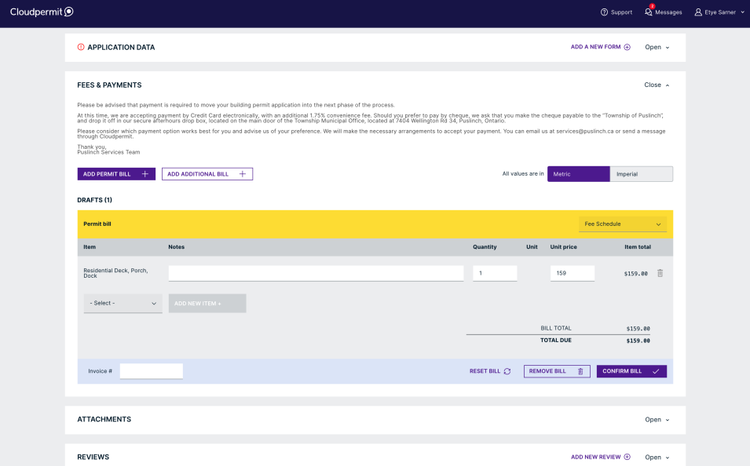
Utility Billing
Utility billing helps you bill customers for utility services, including water, gas, and electricity. The software uses records from meter readings and pairs those records with the billing rate to determine the amount owed.
Meter readings are compared to historical values to determine if anything is out of the norm. For example, if the water meter readings are much higher than normal, there might be a leak in the building. The software will notify you of any anomalies so you can either make repairs or notify the customer of an issue.
Some systems also have a self-service portal that allows customers to pay bills, check account status, and monitor utility usage.
Municipal Accounting
Financial management tools include basic accounting, financial reporting, and budgeting. The system keeps track of grant funds and their allocation. The spending and allocation of funds are closely monitored to ensure municipal departments stay within budget. Municipal software also creates reports, including the statement of revenue and expenditures, that follow the Governmental Accounting Standards Board (GASB) recommended format.
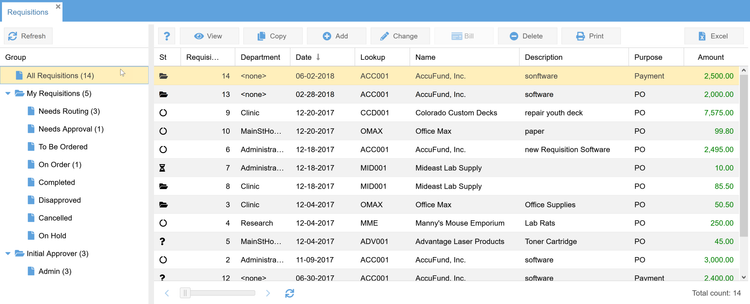
Work Order Management
Municipal software manages work orders to keep tasks organized and make it easy to assign tasks to qualified personnel. It also manages schedules and assigns tasks for routine maintenance on government-owned assets and unexpected repair projects. Work orders can be prioritized based on the urgency or value of the project. Citizens can submit repair and inspection requests through a website or self-service portal. They can also track the status of the project from the portal.
Reports can be created to monitor productivity and outstanding vs. completed work orders. Service history reports can also be generated, so you can see when an asset was last worked on, what materials or equipment was used, and who worked on the project.
Asset Tracking
Software tracks the location, quantity, value, and condition of equipment, tools, or machinery. It also logs historical data, including the asset’s age and the last maintenance done. Preventative maintenance can be scheduled based on the previous service date to extend the life of the assets. GPS tracking is also included in some municipal solutions. This allows you to view real-time locations of your assets, so you can spend less time tracking them down.
Some assets include:
- Equipment in government-owned buildings
- Fire hydrants
- Bridges
- Streetlights
- Sewage/wastewater pump stations
- City-owned trees
- Parks
Benefits
Municipality software helps you reduce data silos, streamline operations, and ensure better service delivery to residents.
Improved Efficiency
Public works software can improve issue resolution rates. These systems make it much easier to track and manage service requests, maintenance schedules, and work orders. This helps you handle repairs, community services, and inspections promptly, improving response times and resident satisfaction overall.
Smarter Decision-Making
Modern software integrates with geographic information systems (GIS) to deliver a visual representation of infrastructure, assets, and service areas. Whether it’s tracking radio towers or parking facilities, GIS helps you make data-driven decisions about urban development and public safety.
Better Document Management
A built-in document management system helps you digitize and organize everything from tax records to permit applications. This reduces reliance on paper while improving security and accessibility. Plus, local government software supports compliance with local, state, and federal regulations like the Federal Information Security Modernization Act (FISMA).
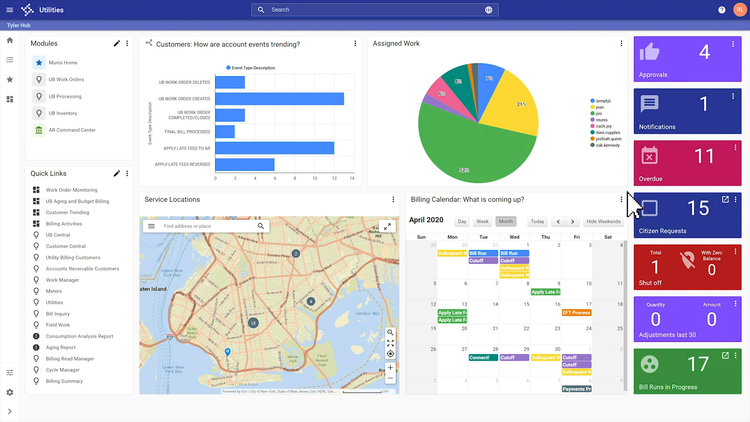
Pricing Guide
Entry-Level Tier
- Company Size: 1–20 employees
- Average Yearly Cost: $3,000–$10,000 per year
- Examples: Edmunds GovTech Basic Suite, Blackbaud Financial Edge NXT Essentials, Zobrio Fund Accounting
Mid-Tier
- Company Size: 20–100 employees
- Average Yearly Cost: $10,000–$50,000 per year
- Examples: Edmunds GovTech Full Suite, Tyler Technologies Incode, Blackbaud Financial Edge NXT, CityView Essentials
High-Tier
- Company Size: 100–500 employees
- TCO: $50,000–$200,000 per year
- Examples: Tyler Enterprise ERP, CentralSquare Finance Enterprise, OpenGov, CityView Enterprise
Enterprise Tier
- Company Size: 500+ employees
- Average Yearly Cost: $200,000–$1 million+ per year
- Examples: Oracle Public Sector Cloud, SAP S/4HANA for Public Sector, Tyler Technologies Enterprise Suite, Workday for Government





















